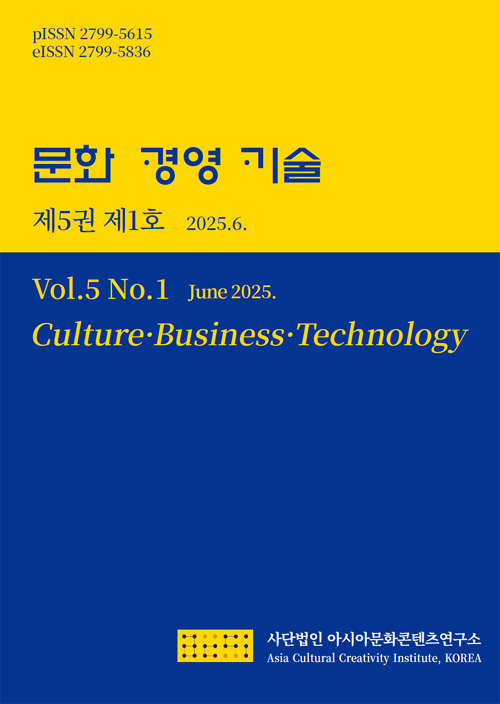- 영문명
- Power, Body, and Struggle: An Analysis of the Body from Foucault’s Perspective—A Case Study of the Film Vegetarian
- 발행기관
- 아시아문화콘텐츠연구소
- 저자명
- Wang Jiawei
- 간행물 정보
- 『문화·경영·기술』제5권 제1호, 69~93쪽, 전체 25쪽
- 주제분류
- 인문학 > 기타인문학
- 파일형태
- 발행일자
- 2025.06.30
5,800원
구매일시로부터 72시간 이내에 다운로드 가능합니다.
이 학술논문 정보는 (주)교보문고와 각 발행기관 사이에 저작물 이용 계약이 체결된 것으로, 교보문고를 통해 제공되고 있습니다.

국문 초록
This article explores how the film Vegetarian portrays social norms, gender oppression, and individual resistance from a physical analysis perspective, based on Foucault’s theory of bodily power. Compared to novel texts, adapted films receive less academic attention, so this article will focus more on the film itself, analyzing how its visual language conveys the process by which the female protagonist challenges social norms through physical changes. This text symbolically defies patriarchal society’s regulations on women’s bodies through the actions of the female protagonist Yinghui in the movie, who refuses to eat meat. Her body was not only an object of social power but also a arena for resistance. The film uses visual metaphors, such as shots, lighting, and scene construction, to depict Yinghui’s struggles in patriarchal society, particularly her conflicts with her family, rejection of meat, and her reshaping of her body as a ‘tree,’ reflecting how women seek to establish individual subjectivity under social control. This article combines Foucault’s disciplinary power theory, body theory, and feminist perspective to analyze how films reveal the omnipresence of power structures through Ying Hui’s bodily changes, and how individuals seek freedom during the process of being disciplined. The final film not only portrays women’s struggles in patriarchal societies but also reveals how the body serves as a dual carrier of power control and individual resistance under societal gender norms.
영문 초록
本文基于福柯的身体权力理论,从身体分析的角度探讨了电影≪素食主义者≫如何呈现社会规训、性别压迫以及个体反抗。相比于小说文本,改编电影较少受到学术关注,因此本文将更加聚焦电影本身,分析其影像语言如何传达女主人公英惠通过身体变化挑战社会规范的过程。本文通过电影中英惠通过拒绝肉食的身体行动,象征性地对抗了父权社会对女性身体的规训。她的身体不仅是社会权力运作的对象,同时也是反抗的场域。电影采用视觉隐喻,如镜头、光影和场景构建,表现了英惠在父权社会中的挣扎,特别是英惠与家人的冲突、对肉食的拒绝以及对自身身体成为‘大树’的重新塑造,反映了女性在社会控制下如何寻求个体主体性的确立。本文结合福柯的规训权力理论、身体理论以及女性主义视角,分析电影如何通过英惠的身体变化揭示权力结构的无处不在,以及个体如何在被规训的过程中寻找自由。最后电影不仅呈现了女性在父权社会中的抗争,同时也揭示了在社会性别规训下,身体作为权力控制和个体抵抗的双重载体。
목차
1. 引言
2. 父权压迫下的女性身体
3. 性别、暴力与社会规训的交织
4. 权力规训下的反抗与觉醒
5. 结论
参考文献
해당간행물 수록 논문
참고문헌
관련논문
인문학 > 기타인문학분야 BEST
더보기인문학 > 기타인문학분야 NEW
- 세계관 해석에 근거한 자살 유가족을 위한 애도의 철학상담: 야스퍼스의 『세계관의 심리학』을 중심으로
- 디지털 치료제와 환자의 자율성: 사전동의 과정 재구성을 위한 제언
- 데카르트 윤리학에서 개인의 자유와 상호 존중
최근 이용한 논문
교보eBook 첫 방문을 환영 합니다!

신규가입 혜택 지급이 완료 되었습니다.
바로 사용 가능한 교보e캐시 1,000원 (유효기간 7일)
지금 바로 교보eBook의 다양한 콘텐츠를 이용해 보세요!



